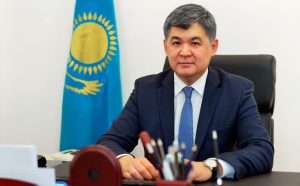During the closing statements at their trial on October 26, former Health Minister Yelzhan Birtanov and his then-deputy, Olzhas Abishev, pointed fingers at a “medical mafia” that supposedly hampered the digitalization process and now wants them imprisoned.
Birtanov faces six years in prison for abuse of power and embezzlement, while Abishev could be sentenced to five years. Both claim innocence. They had dealt with a project on the digitalization of healthcare services in the midst of the COVID-19 pandemic. Birtanov served as health minister from January 2017 to late June 2020, when he resigned and was substituted by another of his deputies, Alexey Tsoi. In late October 2020, he was arrested.
The accusation comes from the Financial Monitoring Agency (FMA), which argues that Birtanov and his deputy caused damage to the state budget by paying for, but failing to implement, a digitalization project that had been agreed on before 2017 with the Croatian company Ericsson Nikola Tesla. The company’s CEO, Gordana Kovacevic, twice denied wrongdoing in official letters to Kazakhstan’s President Kassym-Jomart Tokayev in 2020 and to then-health minister Tsoi in 2021. Similarly, Birtanov and Abishev insist that they acted in accordance with the terms of the project.
In addition, Birtanov claims he contributed to saving money from the state budget with this and other digitalization projects he was carrying forward. If found guilty, they could now be forced to return 1.5 billion tenge ($3.2 million) in allegedly embezzled funds and Birtanov could have to pay back 5.5 million tenge ($11,500) for the alleged improper use of an air ambulance.
“How could the desire to modernize the industry be regarded by the state as corruption?” Birtanov asked the court during his closing statement.
“We fought against corruption, and for this the FMA and the prosecutor’s office decided to punish us,” Abishev said.
According to the former health minister, the accusation regarding the improper airlift from Taraz in June 2020 to the capital has “no grounds.” At the time, Birtanov was on a work visit with other ministers and had developed COVID-19 symptoms. He proceeded to self-isolate and was brought back to the capital on an Antonov, an older Russian plane, instead of the state-operated, modern Airbus aircraft that was booked for the ministerial team. Once in the capital, he tested positive for the virus, confirming his original suspicions, and was hospitalized. Birtanov argued that this transfer method avoided the spreading of the virus among his colleagues.
The strongest accusation against Birtanov and his team remains the embezzlement regarding the digitalization project, which entails a payment to Ericsson Nikola Tesla for an unfulfilled project.
Yerzhan Birtan, the ex-minister’s brother and a vocal member of his defense team, said that the abuse of power on part of the FMA is evident.
“The FMA not only fabricated this absurd case, but also forcefully stopped all works on the digital platform one year before the project was supposed to be completed, in November 2021,” Birtan said in a telephone conversation with The Diplomat.
Digitalization is at the core of the government’s strategy to fight corruption in state and quasi-state sectors.
“The digitalization [of healthcare systems] had become a pain in the neck for the medical mafia. [As a result,] their criminal profits plummeted. Smuggling channels were blocked. It was obvious that an answer from this mafia was coming,” Abishev said in his closing statement.
In their documents, the defendants show that a 66 billion tenge ($140 million) scheme by which medicines were previously allocated through corrupted channels had been broken up thanks to the digitalization of the services.
“There is no crime, just as there is no personal gain,” Birtanov concluded.
Birtanov was appointed to his ministerial job by former President Nursultan Nazarbayev and then confirmed in February 2019, just three weeks before Nazarbayev resigned, paving the way for Tokayev’s presidency. In subsequent partial government reshufflings, Birtanov maintained his position. The spiraling of his case, from poster boy of Kazakhstan’s healthcare sector to corrupt official, seems at odds with the country’s path toward democratization heralded by Tokayev.
On October 28, the court is poised to make a final decision on the case and the defendants argue that this is a test for Tokayev’s “New Kazakhstan”: “Will it continue to bend the rule of law to keep certain groups in power or will it finally allow a real fight against corruption and do right by freeing the falsely accused ex-officials?” Birtanov’s brother asks.

































